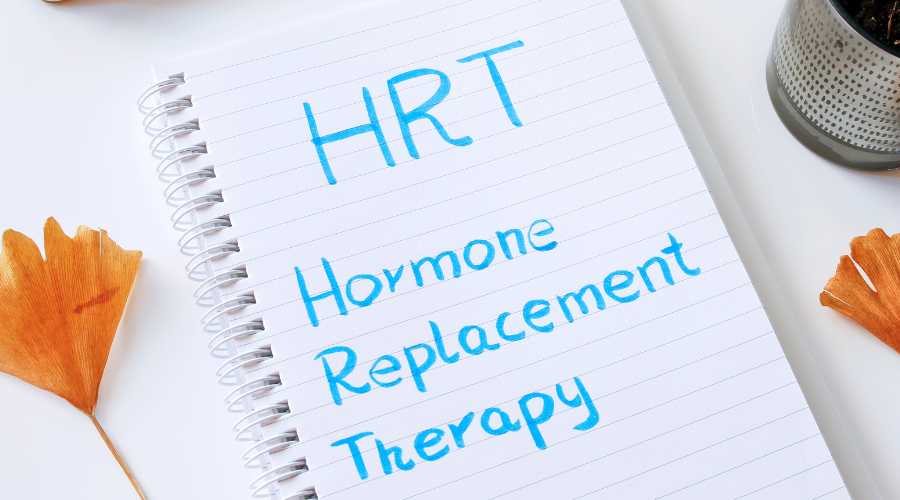World Menopause Day: Understanding HRT

World Menopause Day, spearheaded by the International Menopause Society, is held every year on the 18th of October.
At Hormone Health, we support World Menopause Day as our team of associates provide healthcare for women in the sexual, reproductive and post-reproductive phases of their lives.
The purpose of World Menopause Day is to raise awareness of menopause and the support options available for women to help improve their health and wellbeing.
The theme for 2024, set by the International Menopause Society, is menopause hormone therapy, known in the UK as HRT (Hormone Replacement Therapy), helping to share information on how HRT can improve women’s quality of life during this phase of their life.
Why it’s important to support women during menopause
Menopause is a significant transition that affects women physically, emotionally, and mentally.
Symptoms like hot flushes, sleep disturbances, vaginal and urinary symptoms, mood swings, and brain fog can make everyday life challenging.
Additionally, long-term health concerns such as osteoporosis and cardiovascular disease can arise due to hormonal changes which HRT can help with.
This is why it’s critical to support women by raising awareness about their HRT treatment options to prevent or reduce the severity of long-term health issues while empowering women to take control of their well-being and day-to-day quality of life.
What is HRT?
Hormone Replacement Therapy (HRT) is a treatment designed to help women manage their symptoms of perimenopause and menopause, which occur due to fluctuations in oestrogen levels.
These hormonal changes can lead to a variety of symptoms, from hot flushes to mood swings to aches and pains, as hormones play a key role in regulating essential body processes like metabolism, immunity, and even behaviour.
By adding the hormones back into the body, that start to decline during menopause, hormonal balance can be restored, helping to alleviate symptoms and improve overall well-being.
Keeping a symptom diary can also be helpful for women to track changes, allowing a doctor to personalise a women’s treatment plan to ensure the best outcome.
Who should consider using HRT?
HRT can be beneficial for women in perimenopause and menopause when symptoms are intense and affecting the quality of their daily life.
Menopause associated symptoms can include:
- Hot flushes and night sweats
- Brain fog
- Joint pains
- Mood swings
- Osteoporosis
- Painful sex
- Loss of libido
- Vaginal dryness
- Insomnia
- Headaches
- Depression
- Anxiety
- Low energy
HRT can also help women who are at risk of osteoporosis and heart disease because HRT strengthens bones and protects heart health. However, HRT is not suitable for every woman.
Women who have had breast cancer should avoid using HRT and talk to their doctor about other ways to manage their symptoms.
If there is a history of stroke, deep-vein thrombosis (blood clots), or severe liver disease, the oral form of HRT should not be used. HRT patches and gel may be an option for them instead.
A thorough consultation with a healthcare provider is crucial to determine whether HRT is the right choice based on a woman’s medical history and symptoms.
What types of HRT are available for women?
The type of HRT a doctor prescribes a woman with perimenopause or menopause systems will depend on their health history and whether they have a uterus.
Two key hormones are involved in HRT: oestrogen and progesterone. These hormones fluctuate in perimenopause and eventually decline by the time of menopause.
Oestrogen-only and combined oestrogen and progesterone
Oestrogen-only HRT is given to women who do not have a uterus and combined oestrogen and progesterone is for women who still have a uterus, as progesterone protects the uterus from the effects of oestrogen.
Women may want to discuss the possibility of using testosterone with their doctor, although not licensed for treatment of menopause, testosterone can help if libido and/or energy levels are low.
HRT can be administered in several ways.
- Oral – tablets
- Transdermal – patches or gels
- Subcutaneous – pellets
- Vaginal – creams or tablets
It’s important to note there’s no one-size-fits-all approach and a doctor will tailor the treatment to the woman’s needs.
There is more than one way to take HRT, depending on where a woman is in her menopause transition.
1/ Sequential
Sequential is when oestrogen is used in the first part of the menstrual cycle and with combined oestrogen and progesterone for the second part. Available in tablets or patches. This is normally when you are still having periods.
2/ Continuous combined
Continuous is when oestrogen and progestogen are used every day of the menstrual cycle, suitable for postmenopausal women. Available in tablets or patches. This is normally when you have reached menopause, meaning you have no periods for 12 months or more.
3/ Intrauterine system (known as Mirena)
Intrauterine is when progesterone-only is delivered directly into the womb using an implanted coil device. This method is a flexible way to dose progesterone and provide womb lining protection, recommended when other methods have failed or if using the treatment routinely is problematic.
When can women start using HRT?
Women typically start HRT during peri-menopause – the transitional phase leading up to menopause when symptoms can be intense due the fluctuating hormone levels – or early in post-menopause when periods have stopped.
Starting treatment during these stages can offer relief from symptoms and provide protection against osteoporosis and heart disease.
The lowest effective dose is recommended to begin with, to minimise side effects and adjust the treatment as needed over time.
Consulting with a healthcare professional ensures the right treatment plan is developed based on when symptoms begin and how they progress.
Why taking HRT is important for women
HRT plays a vital role in improving the overall quality of life for many women during peri-menopause and menopause.
The most immediate benefit is the relief of uncomfortable and intense symptoms, and the benefits of HRT go beyond this. HRT can help to prevent loss of bone density which happens following menopause, thereby lowering the risk of osteoporosis and fractures.
HRT also supports heart health by reducing the likelihood of cardiovascular disease and may positively impact cognitive function, mood, and skin health.
While concerns about the safety of HRT have been raised in the past, current research shows that when used appropriately, under the guidance of a doctor, HRT is a safe and effective treatment for women who are able to use it.
Reporting on current HRT controversies
Of particular interest to health professionals and women with a special interest in learning more about menopause, President of the International Menopause Society, and Founder and Director of Hormone Health, Professor Nick Panay, is the lead author of a White Paper reporting on the current controversies of prescribing HRT.
The report covers:
- Who should use HRT – for instance, what are the key indications
- What types and doses should be prescribed – with particular emphasis on use of the minimum fully effective doses
- When HRT should be started and stopped – i.e. not putting arbitrary limits on duration of HRT usage
- Why HRT, including the question of whether menopause is over medicalized and the role of non-hormone options
- Where HRT is accessed by women, looking at low to middle income countries, and social and political influences on access
Hormone Health Founder and Director, Professor Nick Panay, the lead author of the IMS White Paper, said;

“Healthcare providers worldwide have a duty to provide a supportive, informative environment where women can freely discuss menopause as it affects them individually, express their concerns and priorities and receive personalized care to optimize their health and well-being in the second half of their lives.”
Prof Nick Panay
Hormone Health Founder and Director
The report can be viewed on the International Menopause Society website.
Final thoughts
World Menopause Day is an opportunity to highlight the importance of supporting women through menopause.
HRT offers women relief from symptoms, helps prevent long-term health risks, and enhances overall well-being and quality of life.
Every woman’s experience with menopause is unique, and at Hormone Health, we are committed to providing exceptional care for women as they move through this phase of their life.